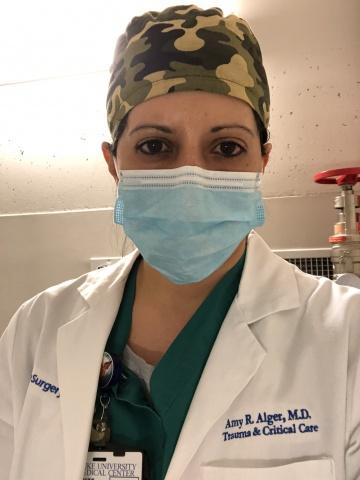
This story is part of an ongoing series of reflections from Duke Surgery faculty and staff.
Before getting into her car to go home, Dr. Amy Alger begins a 3-step decontamination process. She changes out of her scrubs and personal protective equipment (PPE), scrubs her hands, and puts on new clothes. As soon as she gets home, she immediately throws her clothes in the laundry and takes a shower, all before interacting with her kids.
As co-medical director of the COVID-19 intensive care unit (ICU), Dr. Alger sees firsthand the impact of the COVID-19 pandemic on patients. Dr. Alger, a trauma surgeon, balances her time between treating patients with COVID-19 and patients requiring trauma and emergency general surgery. Because of the severity of injuries, the trauma team may not know if patients are infected with the SARS-CoV-2 virus upon arrival at the emergency department. This means taking extreme safety precautions, such as wearing PPE all day long.
“It’s too soon to tell, but the pandemic may be resulting in a decrease in trauma cases. Typically, we see an increase in trauma cases this time of year. It’s challenging because we can’t screen our patients for COVID-19 since many of them are unconscious. We just have to assume they have the virus and wear PPE. Thankfully, we have the point-of-care test.”
With the rapid, point-of-care test, trauma surgeons can test for COVID-19 at the patient’s bedside and obtain results within 15 minutes, enabling patients to receive more timely care. This window of time is critical because in a life and death situation, every second counts.
Dr. Alger is uniquely prepared for the challenges associated with the COVID-19 response. As a trauma surgeon and a Lieutenant Colonel in the United States Army serving in both Iraq and Afghanistan, she met the demands of a high-intensity, highly unpredictable surgical environment where surgeons need to be “at the ready” to provide optimal care to patients who sustain devastating, life-threatening injuries.
“I greatly valued the time I spent serving, especially my experience while deployed,” says Dr. Alger. “It gave me an entirely different perspective on life. I learned to be extremely patient, that things will frequently change, and to never become complacent. I have also perfected my ability to be resilient. It was also essential to have or learn new healthy coping mechanisms because deploying is both physically and psychologically exhausting.”
Life at home for Dr. Alger has also become more challenging since the COVID-19 pandemic began.
“Because we’re working from home, it is challenging,” says Dr. Alger. “I’m taking care of my kids while my husband is deployed. I worry most about bringing the virus home to my kids.” She says she is fortunate to have family in the local area. Her twin sister, Duke plastic surgeon Dr. Kristen Rezak, is close by to offer support when needed.
This circle of support also extends to her Duke family. It is thanks to this support system that she says the group of trauma surgeons can cope with the stresses of the pandemic. Because there is a small number of trauma surgeons at Duke, the team pays close attention to each other’s health and safety.
“We have a very supportive group,” says Dr. Alger. “We have a virtual happy hour. We check in with each other to make sure no one is sick.”
She says this same teamwork mentality is demonstrated by the entire Duke Health team from the ICU nurses to the environmental workers. Team members are handling the complexity of the pandemic through solidarity, everything from organizing PPE supplies to using walkie-talkies to facilitate communication in the ICU.
Dr. Alger says she is especially grateful for the ICU nurses. “The ICU nurses are amazing. They are flexible and resilient. The COVID-19 response is like a moving target. Things change from one day to the next. They’re taking it all in stride.”
Give to Duke Trauma and Critical Care Surgery
The Duke Division of Trauma and Critical Care Surgery relies on individual gifts and philanthropic partnerships to help support our clinical, research, and educational missions and to secure funds for the future.
